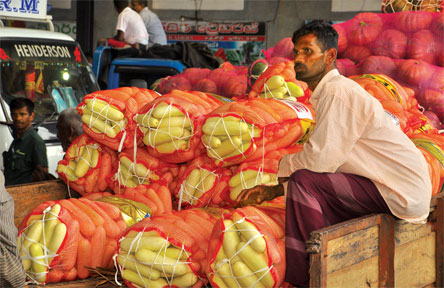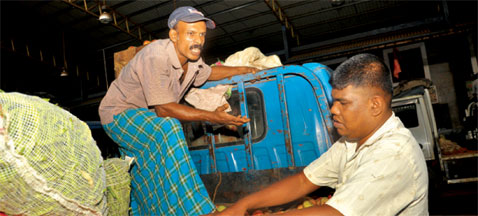No end in sight to vegetable crisis
Gamini Warushamana
After a serious crisis where hundreds of tonnes of vegetables
perished as a result of oversupply, bad weather and the resulting drop
in quality, the wholesale price of vegetables at the Dambulla Dedicated
Economic Centre (DEC) is picking up slowly. Traders and farmers expect
the prices to stabilise in the coming weeks.
 |
|
No buyers |
The crisis faced by vegetable farmers is not a new or strange one.
Market failure due to oversupply that affects farmers on the one side
and the consumers on the other are reported frequently.
There are many reasons for this perishable commodity. Therefore the
views of stakeholders and first hand information on how markets function
gives an insight to the issue.
The manager of the Dambulla DEC, Cristy Wijeratne who welcomed us was
in an aggressive mood and he queried what news value the media had to
report on price decline.
According to him, since market failure is a common scenario there is
nothing to report. The media is also responsible for the market crisis
because they exaggerate the situation.
In the latest crisis, farmers suffered due to exaggerated media
reports because farmers did not bring their products to the market
believing media reports, on the days that followed, he said.
He denied media reports which stated that thousands of tonnes of
vegetables that couldn't be sold were dumped during the past few weeks.
He said that only vegetables that always pick low prices such as ladies
fingers, cucumber and pumpkin were destroyed as a result of massive
oversupply, but that reports saying that hundreds of tonnes were dumped
were not true because nobody had measured it.
However, traders said even vegetables such as beans were dumped.
According to Wijeratne, the loss to farmers was not an issue because
they are used to this kind of crisis and farming is like a game, they
win sometimes and lose sometimes.
 |
|
Cristy Wijeratne |
Usually Wijeratne and his office do not respond to media inquiries
and declined comment on the market situation. He said that it is not his
duty and his office sends market reports daily to the Secretary to the
Ministry of Consumer Affairs and the media can get the necessary
information from the Secretary.
This bureaucratic argument is perfect but not practical.
Wijeratne said that this was a good lesson for farmers and they
should know what to grow. He pointed out several reasons for oversupply
of vegetables.
The Dambulla DEC receives supplies from farmlands all over the
country. Buyers too come here in search of quality fresh vegetables and,
therefore, low quality products are rejected and dumped in large
quantities daily.
Some farmers who bring in low quality products are unable to find
buyers and dump the produce. Cultivation of imported hybrid vegetable
seeds is another reason. These vegetables are soft and rot easily.
Though this problem has been discussed time and again, the same
issues prevail, without being resolved. We did not see a single plastic
crate being used for the transportation of vegetables. Polythene sacks
and traditional transport methods continue to be used.
Wijeratne said that people resist change and after the government
spent millions on plastic crates and on a huge campaign to promote them
the process has gone back to the old system.
In Dambulla, trading is mainly between intermediaries and not farmers
and retailers or consumers. At a glance, the market looks competitive
and prices are determined by supply and demand.
Traders who collect products from the farmers bring them to Dambulla
and most of the buyers too are wholesalers. The market price is
determined by this trade in large quantities. Trading takes place
through shops in the market and the shop owner gets a commission of Re.1
per kilo.
Last Tuesday, R.M. Saman, a collector had brought a lorry load of
beans and tomatoes from Hanguranketa. He offered beans at Rs. 45 per
kilo and tomatoes at Rs. 55 per kilo. He was worried because there were
only a few buyers and therefore the demand was low. K. Athulla, a buyer
from Kinniya bid at Rs. 40 per kilo for beans and Rs.45 per kilo for
tomatoes and Saman quickly accepted the bid and closed the deal.
The transaction took place through Rathna Stores. Athulla had reasons
to reduce prices. The quality of the vegetables was poor due to heavy
rains that prevailed during the past few weeks.
Saman said that he bought beans at Rs. 40 per kilo and tomatoes at
Rs. 50 per kilo and incurred a huge loss.
 |
|
A transaction in
progress. |
However, Asanga Kumara, a farmer from Elagamuwa, Kekirawa said that
it was not true. Normally the collectors pay low prices to farmers and
they have a sufficient margin to cover transport costs, losses due to
damages and price fluctuations.
The difference between the wholesale price of vegetables in the DEC
and the retail market just outside the DEC was over 100 percent. For
instance, the wholesale price of beans was Rs. 40 per kilo and the
retail price was Rs. 80 per kilo.
Farmers said that their cultivation decisions are based on factors
such as market prices, cost and availability of water and there is no
cultivation plan or coordination.
The intermediaries in the supply chain earn a higher profit than the
farmers. Traders said that the margin is higher because they have to
cover transport cost, losses in transportation and the risk of price
fluctuation.
However, they are better informed today through mobile phones and
they know the market price at the time they buy vegetables from the
farmers. Farmers do not have the bargaining power because after they
pluck their vegetables they have to sell them as quickly as possible.
There are many reasons for the frequent crisis in marketing
vegetables and the market may never solve them. Issues are linked with
the disorganised agriculture sector, lack of information and
coordination. Despite the losses they incur, neither the farmers nor the
traders could give up their jobs, but it is a loss to the national
economy.
|


